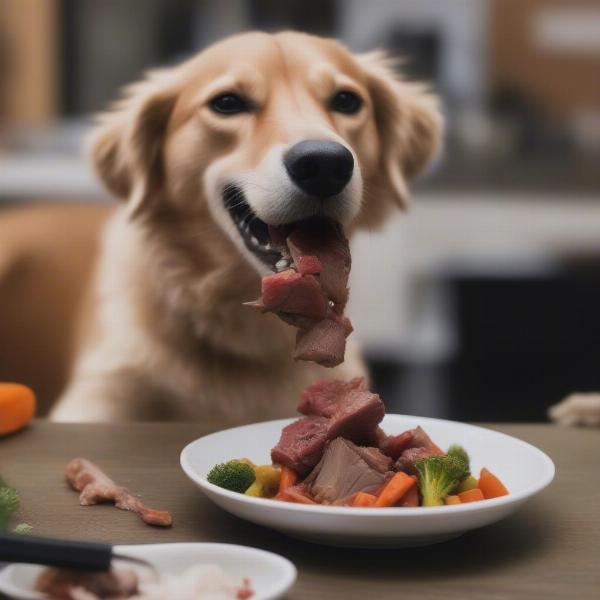Deer meat, also known as venison, is gaining popularity as a novel protein source for dogs. Many owners are curious about its nutritional benefits and whether it’s a suitable alternative to traditional dog foods. This article will explore the pros and cons of feeding deer meat to your canine companion, covering everything from nutritional value to safe preparation methods.
Nutritional Benefits of Venison for Dogs
Venison is a lean protein source packed with essential nutrients that can contribute to a dog’s overall health. It’s rich in B vitamins, iron, and zinc, which support energy levels, immune function, and healthy skin and coat. Compared to beef, venison is lower in fat and cholesterol, making it a good option for dogs prone to weight gain or those with sensitive stomachs. The high protein content helps build and maintain muscle mass, crucial for active dogs. Furthermore, venison is a good source of conjugated linoleic acid (CLA), which is believed to have anti-inflammatory and anti-cancer properties.
Is Deer Meat Safe for Dogs?
Generally, deer meat is safe for dogs when prepared correctly. However, there are some important considerations. Raw venison carries the risk of parasites and bacteria, just like any other raw meat. Therefore, it’s crucial to cook the meat thoroughly to eliminate these potential health hazards. Avoid seasoning the venison with onions, garlic, or excessive salt, as these can be toxic to dogs.
Potential Risks of Feeding Deer Meat to Dogs
While venison offers numerous health benefits, there are potential risks to be aware of. Overconsumption of any single protein source, including venison, can lead to nutritional imbalances. It’s essential to offer a varied diet that includes other protein sources, vegetables, and fruits. Furthermore, some dogs may have allergies to venison, so it’s advisable to introduce it gradually and monitor for any adverse reactions.
 Feeding Deer Meat to Dogs Safely
Feeding Deer Meat to Dogs Safely
How to Prepare Deer Meat for Your Dog
The safest way to feed venison to your dog is by cooking it thoroughly. Avoid adding any seasonings that could be harmful to dogs. You can boil, bake, or grill the venison until it reaches an internal temperature of 165°F (74°C). Once cooked, you can serve the venison on its own, mix it with your dog’s regular food, or use it as a base for homemade dog treats.
Can Dogs Eat Deer Bones?
While dogs may enjoy chewing on bones, deer bones, especially cooked ones, can splinter and cause serious internal injuries. Avoid giving your dog deer bones, and opt for safer chewing alternatives like dental chews or rubber toys.
Balancing Venison with Other Food Groups
Venison can be a valuable addition to your dog’s diet, but it shouldn’t be the sole source of nutrition. A balanced diet for dogs should include a variety of protein sources, healthy fats, carbohydrates, vitamins, and minerals. Consult with your veterinarian to create a personalized meal plan that meets your dog’s specific nutritional needs.
Conclusion
Deer meat can be a healthy and nutritious treat or meal component for your dog when prepared and served responsibly. Its lean protein and abundance of nutrients make it a tempting alternative to traditional protein sources. However, remember to cook the venison thoroughly, avoid harmful seasonings, and monitor your dog for any signs of allergies or digestive upset. deer meat for dogs can be a beneficial addition to a balanced canine diet.
FAQ
- Can puppies eat deer meat? Yes, puppies can eat cooked deer meat, but introduce it gradually and in small portions.
- Is raw deer meat safe for dogs? No, raw deer meat can contain parasites and bacteria that can harm your dog. Always cook venison thoroughly before feeding it to your dog.
- What are the signs of a venison allergy in dogs? Signs of a venison allergy may include itching, skin rashes, vomiting, and diarrhea.
- How much deer meat should I feed my dog? The amount of deer meat you should feed your dog depends on its size, age, and activity level. Consult with your veterinarian for personalized guidance.
- Can dogs eat deer antlers? Deer antlers are generally considered safer than bones, but they can still pose a choking hazard, especially for smaller dogs. Supervise your dog closely if you give them a deer antler.
- Can deer meat cause pancreatitis in dogs? High-fat meats can contribute to pancreatitis in dogs. While venison is relatively lean, ensure you trim off excess fat before feeding it to your dog, especially if they are prone to pancreatitis.
- Can I feed my dog deer heart and liver? Deer heart and liver can be fed to dogs in moderation as they are rich in nutrients. However, overfeeding organ meats can lead to vitamin A toxicity, so consult with your vet about safe serving sizes.
ILM Dog is a leading international online resource dedicated to providing dog owners with expert advice on all aspects of dog care. From breed selection and puppy care to senior dog health and training tips, ILM Dog offers a wealth of information to help you provide the best possible care for your furry friend. We specialize in breed selection, health and medical care, training and behavior, nutrition, grooming, products, and accessories. Contact us at [email protected] or +44 20-3965-8624 to learn more. Visit us today at ILM Dog.